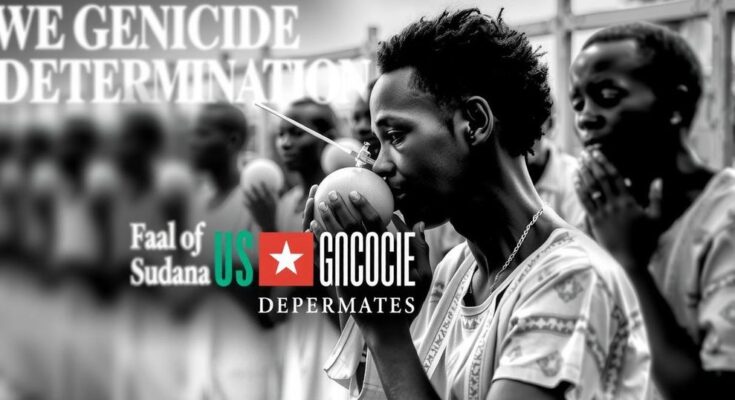On January 7, 2025, the U.S. determined that the RSF committed genocide in Darfur. Sanctions were imposed on RSF commander Mohammed Hamdan Dagalo and his associates due to widespread atrocities. Human Rights Watch supports U.S. action and calls for further measures against those impeding aid. Nicole Widdersheim of HRW emphasizes the need for U.S. policy to focus on accountability and civilian protections.
On January 7, 2025, the United States government announced its determination that the Rapid Support Forces (RSF) had committed genocide in Darfur amid the ongoing conflict in Sudan. In response, the U.S. sanctioned Mohammed Hamdan Dagalo, the commander of the RSF, as well as seven companies associated with the group, for their roles in perpetrating atrocities. This recognition of genocide is a significant step towards holding perpetrators accountable as the RSF has been engaged in violent conflict against the Sudanese Armed Forces (SAF) since April 2023. Human Rights Watch has provided evidence of ethnic killings, sexual violence, and widespread displacement attributed to the RSF’s actions in West Darfur, highlighting the dire humanitarian situation and the urgent need for further investigations into these crimes.
The U.S. government’s declaration of genocide and resultant sanctions are viewed as critical measures towards achieving justice for the affected populations in Sudan. It is essential that the U.S. share relevant evidence with the United Nations Fact-Finding Mission and the International Criminal Court so that the pursuit of justice for the Sudanese people can be advanced. Furthermore, it is imperative for the U.S. and its allies to broaden sanctions against other entities impeding humanitarian aid and violating the existing arms embargo in Darfur, particularly pressuring nations such as the United Arab Emirates to cease their weapons transfers to Sudan.
The context of the current crisis in Sudan stems from the power struggle between the RSF and the Sudanese Armed Forces, which has led to overwhelming humanitarian challenges. Human Rights Watch has been vocal in its calls for a concerted international response, urging the U.S. to recalibrate its approach in the region with a strong focus on accountability and civilian safety. The ongoing violence and humanitarian crisis necessitate immediate and decisive action to protect vulnerable populations.
Nicole Widdersheim, deputy Washington director at Human Rights Watch, remarked, “The State Department’s announcement should be the first step toward redefining U.S. policy in Sudan with accountability and civilian protection at the center. We hope to see more pressure from the United States on the parties to the conflict and U.S. allies to respond to past and ongoing atrocities and human suffering.”
The sanctions against Dagalo and the RSF mark a pivotal moment in addressing the grave violations occurring in Sudan. It is crucial that the international community recognizes and responds to these atrocities to protect the population and ensure a concerted effort towards peace. By extending these measures, the U.S. and its allies can foster a path towards accountability and relief for the suffering civilians of Sudan. As the situation continues to evolve, sustained pressure and oversight will be vital in achieving meaningful change within the conflict-torn nation.
The conflict in Sudan, particularly in the Darfur region, has its roots in a complex power struggle involving various armed factions, notably the Rapid Support Forces (RSF) and the Sudanese Armed Forces (SAF). The RSF, formed from the Janjaweed militias known for their brutal campaigns during the Darfur genocide in the early 2000s, has remained a significant force in the region. Since April 2023, a resurgence in violence between these two groups has led to widespread human rights violations, including ethnic killings, sexual assault, and forced displacements of civilians. The situation warrants international attention as calls for accountability and protection of civilians become increasingly urgent amid humanitarian crises.
The recognition of genocide in Sudan by the United States is a significant development in the pursuit of accountability for the heinous acts committed by the Rapid Support Forces. Coupled with sanctions against key leaders, this action underscores the growing international obligation to address ongoing atrocities and support the Sudanese population. Moving forward, it is essential that sustained efforts, including sharing evidence and expanding sanctions, continue to build pressure for justice and humanitarian relief in the region.
Original Source: www.socialnews.xyz




